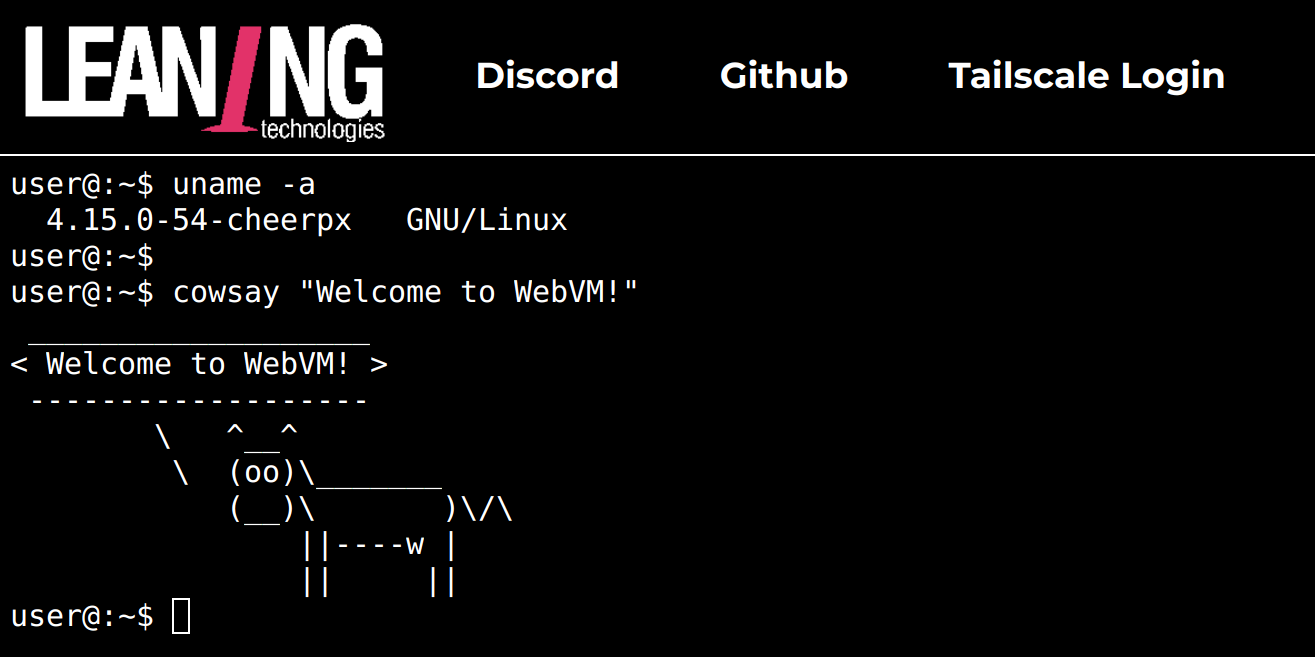| .github/workflows | ||
| assets | ||
| dockerfiles/example | ||
| examples | ||
| tun | ||
| xterm | ||
| favicon.ico | ||
| index.html | ||
| login.html | ||
| network.js | ||
| nginx.conf | ||
| README.md | ||
| scrollbar.css | ||
| serviceWorker.js | ||
| tinycore.html | ||
| tower.ico | ||
WebVM
This repository hosts the source code of for https://webvm.io, a Linux virtual machine that runs in your browser.

WebVM is a server-less virtual environment running fully client-side in HTML5/WebAssembly. It's designed to be Linux ABI-compatible. It runs an unmodified Debian distribution including many native development toolchains.
WebVM is powered by the CheerpX virtualization engine, and enables safe, sandboxed client-side execution of x86 binaries on any browser. CheerpX includes an x86-to-WebAssembly JIT compiler, a virtual block-based file system, and a Linux syscall emulator.
How to: general usage
- go to https://webvm.io
- use the provided terminal environment
- have fun!
How to: enable networking
- go to https://webvm.io
- click "Tailscale Login" in the top right corner
- log in to Tailscale (create an accout if you don't have one)
- if you want to access the public internet, you need an Exit Node. See here for how to set one up. If you just want to access a machine in your Tailscale Network, you don't need it
- depending on your network speed, you may need to wait a few moments for the Tailscale Wasm module to be downloaded
- log in with your Tailscale credentials
- go back to the WebVM tab. You will see your IP address in the top right
- start firing network requests!
How to: login to Tailscale with an Auth key
- Add
#authKey=<your-key>at the end of the URL - Done. You don't need to manually log in anymore
It is recommended to use an ephemeral key.
How to: login to a self-hosted Tailscale network (Headscale)
- Add
#controlUrl=<your-control-url>at the end of the URL - You can combine this option with
authKeywith a&:#controlUrl=<url>&authKey=<key>
How to host WebVM locally
- Replace
CX_VERSIONin index.html and tinycore.html with a valid version of CheerpX. The latest version can be found at https://webvm.io - Run nginx -p . -c nginx.conf in the root of the WebVM directory. WebVM can then be found at
http://localhost:8081
Bugs and Issues
Please use Issues to report any bug. Or come to say hello / share your feedback on Discord.
Browsers support
WebVM and CheerpX are compatible with any browser, both Desktop and Mobile, provided support for SAB, IndexedDB, and the device having enough memory.
More links
Thanks to...
This project depends on:
- CheerpX, made by Leaning Technologies for the virtualization part
- xterm.js, https://xtermjs.org/, for providing the Web-based terminal emulator
- Tailscale for the networking component
- lwIP for the TCP/IP stack, compiled to the Web by Cheerp
License
Copyright (c) Leaning Technologies Limited. All rights reserved.